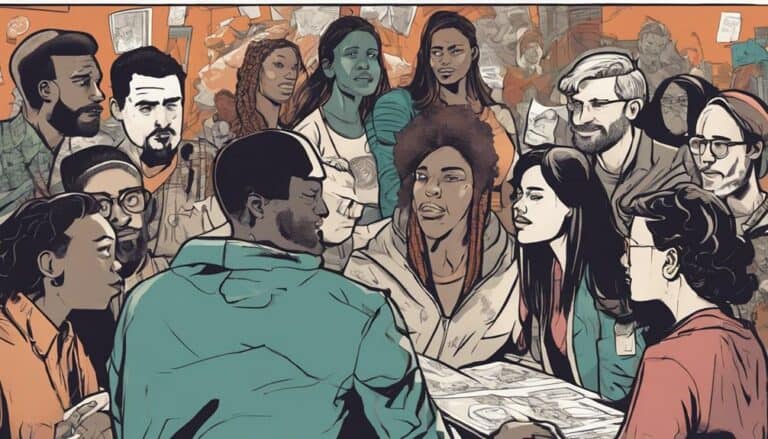Engage with diverse cultural perspectives to enhance critical thinking. Challenge traditional thought patterns and nurture cognitive flexibility. Interact with varied viewpoints to stimulate creativity and innovative problem-solving. Diverse encounters prompt questioning of ingrained assumptions, leading to cognitive growth. Cultivate holistic critical thinking skills by embracing cultural differences. Embrace the benefits of globalized society for developing adaptable problem-solving abilities.
Key Takeaways
- Exposure to diverse cultures challenges conventional thought patterns.
- Interacting with different cultural perspectives fosters cognitive flexibility.
- Cultural diversity sparks creativity and innovation in problem-solving.
- Diversified encounters prompt individuals to question traditional thinking patterns.
- Understanding cultural differences encourages openness to new ideas.
Cultural Exposure and Critical Thinking Skills
Cultivating critical thinking skills through exposure to diverse cultures challenges conventional thought patterns and fosters cognitive flexibility. In educational settings, cultural exposure plays a pivotal role in shaping individuals' problem-solving abilities and cognitive development. The interaction with different cultural thinking styles not only broadens perspectives but also enhances the application of critical thinking in various scenarios.
Within diverse cultural environments, individuals learn to navigate through different self-construals and regulatory modes, which in turn influence the development of their critical thinking skills. Understanding how cultural influences impact the application of critical thinking is essential for designing effective educational programs that cater to a wide range of learners. By embracing cultural diversity, individuals can adapt their problem-solving approaches and think more holistically when faced with challenges.
In essence, cultural exposure acts as a catalyst for refining critical thinking skills, encouraging individuals to approach problems from multiple viewpoints and consider a broader spectrum of solutions. This integration of diverse cultural perspectives enriches cognitive flexibility and equips individuals with the tools needed to thrive in an increasingly interconnected world.
Diverse Perspectives and Problem-Solving
Exposure to diverse perspectives from various cultures amplifies problem-solving capabilities by introducing fresh viewpoints and challenging conventional modes of thinking. Engaging with individuals from different cultural backgrounds promotes critical thinking and enhances problem-solving skills through the following ways:
- Promote Critical Thinking: Cultural diversity encourages individuals to think critically by presenting them with a wide range of perspectives on complex issues.
- Enhance Cognitive Flexibility: Interacting with diverse cultural perspectives fosters cognitive flexibility and adaptability, allowing individuals to approach problems from various angles.
- Foster Creativity and Innovation: Cultural diversity sparks creativity and innovation in problem-solving processes by introducing novel ideas and alternative solutions.
In educational settings, exposure to cultural diversity provides a fertile ground for developing holistic critical thinking skills. By being exposed to multiple viewpoints, individuals can broaden their understanding of complex issues and develop more innovative approaches to problem-solving. This exposure to diverse perspectives not only enriches the learning experience but also equips individuals with essential skills for addressing challenges in an increasingly interconnected world.
Challenging Assumptions Through Diversity
Diversified cultural encounters play a pivotal role in challenging ingrained assumptions and fostering critical thinking skills. Exposure to cultural diversity prompts individuals to question traditional thinking patterns, leading to enhanced problem-solving abilities and cognitive development.
Research indicates a positive correlation between cultural diversity exposure in college and improved critical thinking skills over time. Particularly, White students and those with less academic preparation benefit greatly from these experiences, showing the transformative impact of cultural diversity on critical thinking.
Understanding the nuanced effects of cultural diversity experiences is essential for fostering cognitive development and critical thinking skills. By engaging with diverse perspectives, individuals are pushed to reevaluate their assumptions, broaden their worldview, and develop more sophisticated critical thinking abilities.
Embracing cultural diversity not only challenges existing beliefs but also cultivates a mindset conducive to analytical thinking and effective problem-solving, ultimately shaping individuals into more well-rounded and adaptable critical thinkers.
Enhancing Creativity With Cultural Differences
Challenging ingrained assumptions through diversified cultural encounters not only enhances critical thinking skills but also fosters creativity by exposing individuals to a multitude of perspectives and innovative problem-solving approaches. Cultural diversity plays a significant role in enhancing creativity through the following ways:
- Exposure to Varied Perspectives: Interacting with individuals from different cultural backgrounds broadens your viewpoint, leading to more creative solutions to problems.
- Promoting Open-Mindedness: Understanding cultural differences encourages you to be open to new ideas and ways of thinking, sparking creativity in your problem-solving processes.
- Challenging Biases: Engaging with diverse cultures helps you question your biases, enabling you to approach challenges with a more neutral and creative mindset.
Embracing cultural diversity not only enriches your critical thinking abilities but also nurtures creativity by fostering adaptability and a willingness to explore unconventional solutions. By being open to different viewpoints and approaches, you can discover a world of innovative possibilities.
Globalized Society and Critical Thinking
In a globalized society, the interplay between diverse cultural perspectives and critical thinking skills manifests in nuanced ways that shape individuals' cognitive abilities and problem-solving approaches.
Exposure to a variety of cultural backgrounds in educational settings challenges traditional thinking patterns, encouraging the development of critical thinking abilities. This exposure to cultural diversity not only promotes cognitive flexibility but also enhances problem-solving skills necessary for traversing a globalized world.
Understanding and appreciating cultural nuances and diverse viewpoints contribute to the depth and breadth of critical thinking processes, allowing individuals to approach issues from multiple angles. By incorporating cultural diversity into educational practices, individuals cultivate empathy, open-mindedness, and improved critical analysis skills.
This integration of diverse perspectives not only enhances individual cognitive skills but also prepares individuals to thrive in an interconnected and diverse global society where critical thinking is essential for success.
Conclusion
As you navigate the diverse tapestry of cultures,
your critical thinking skills bloom like a vibrant garden in full bloom.
Each unique perspective is a brushstroke on the canvas of your mind,
creating a masterpiece of problem-solving and creativity.
Embrace the melting pot of ideas and beliefs,
for it's in this rich soil that the roots of your critical thinking skills grow deep and strong,
ready to weather any storm in our globalized society.

